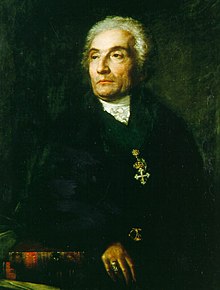
Back جوزيف دي مايستر Arabic چوزيف دى مايستر ARZ Joseph de Maistre AST Жозеф дьо Местр Bulgarian Joseph de Maistre Catalan ژۆزێف دو مێستر CKB Joseph de Maistre Czech Joseph de Maistre Danish Joseph de Maistre German Ζοζέφ ντε Μαιστρ Greek
| Joseph de Maistre | |
|---|---|
 de Maistre ca 1810 | |
| Lahir | 1 April 1753 Chambéry, Kerajaan Sardinia |
| Meninggal | 26 Februari 1821 (umur 67) Torino, Kerajaan Sardinia |
| Karya terkenal |
|
| Era | Filsafat abad ke-18 |
| Kawasan | Filsafat Barat |
| Aliran | |
Minat utama | Filsafat politik |
Joseph-Marie, comte de Maistre (bahasa Prancis: [də mɛstʁ]; 1 April 1753 – 26 Februari 1821)[2] adalah seorang filsuf, penulis, pengacara dan diplomat Savoyard yang mengadvokasikan hierarki sosial dan monarki pada periode tak lama setelah Revolusi Prancis.[3] Disamping hubungan pribadi dan intelektual dekatnya dengan Prancis, Maistre menjadi seluruh masa hidupnya di Kerajaan Sardinia, dimana ia menjabat sebagai anggota Senat Savoy (1787–1792), duta besar untuk Rusia (1803–1817)[4] dan menteri negara untuk mahkamah di Torino (1817–1821).[5]
- ^ John Powell, Derek W. Blakeley, Tessa Powell. Biographical Dictionary of Literary Influences: The Nineteenth Century, 1800-1914. Greenwood Publishing Group, 2001. P267.
- ^ "Joseph de Maistre". Encyclopædia Britannica.
- ^ Beum, Robert (1997). "Ultra-Royalism Revisited," Modern Age, Vol. 39, No. 3, p. 305.
- ^ "Joseph de Maistre," The Dublin Review, Vol. XXXIII, 1852.
- ^ The issue of Maistre's national identity has long been contentious. In 1802, after the invasion of Savoy and Piedmont by the armies of the French First Republic, Maistre had fled to Cagliari, the ancient capital of Kingdom of Sardinia that resisted the French invasion; he wrote to the French ambassador in Naples, objecting to having been classified as a French émigré and thus subject to confiscation of his properties and punishment should he attempt to return to Savoy. According to the biographical notice written by his son Rodolphe and included in the Complete Works, on that occasion Maistre wrote that
Sources such as the Encyclopædia Britannica and the Catholic Encyclopedia identify Maistre as French, by culture if not by law. In 1860 Albert Blanc, professor of law at the University of Turin, in his preface to a collection of Maistre's diplomatic correspondence wrote that:He had not been born French, and did not desire to become French, and that, never having set foot in the lands conquered by France, he could not have become French.
— Œuvres complètes de Joseph de Maistre, Lyon, 1884, vol. I, p. XVIII.... this philosopher [Maistre] was a politician; this Catholic was an Italian; he foretold the destiny of the House of Savoy, he supported the end of the Austrian rule [of northern Italy], he has been, during this century, one of the first defenders of [Italian] independence.
— Correspondance diplomatique de Joseph de Maistre, Paris, 1860, vol. I, pp. III-IV.